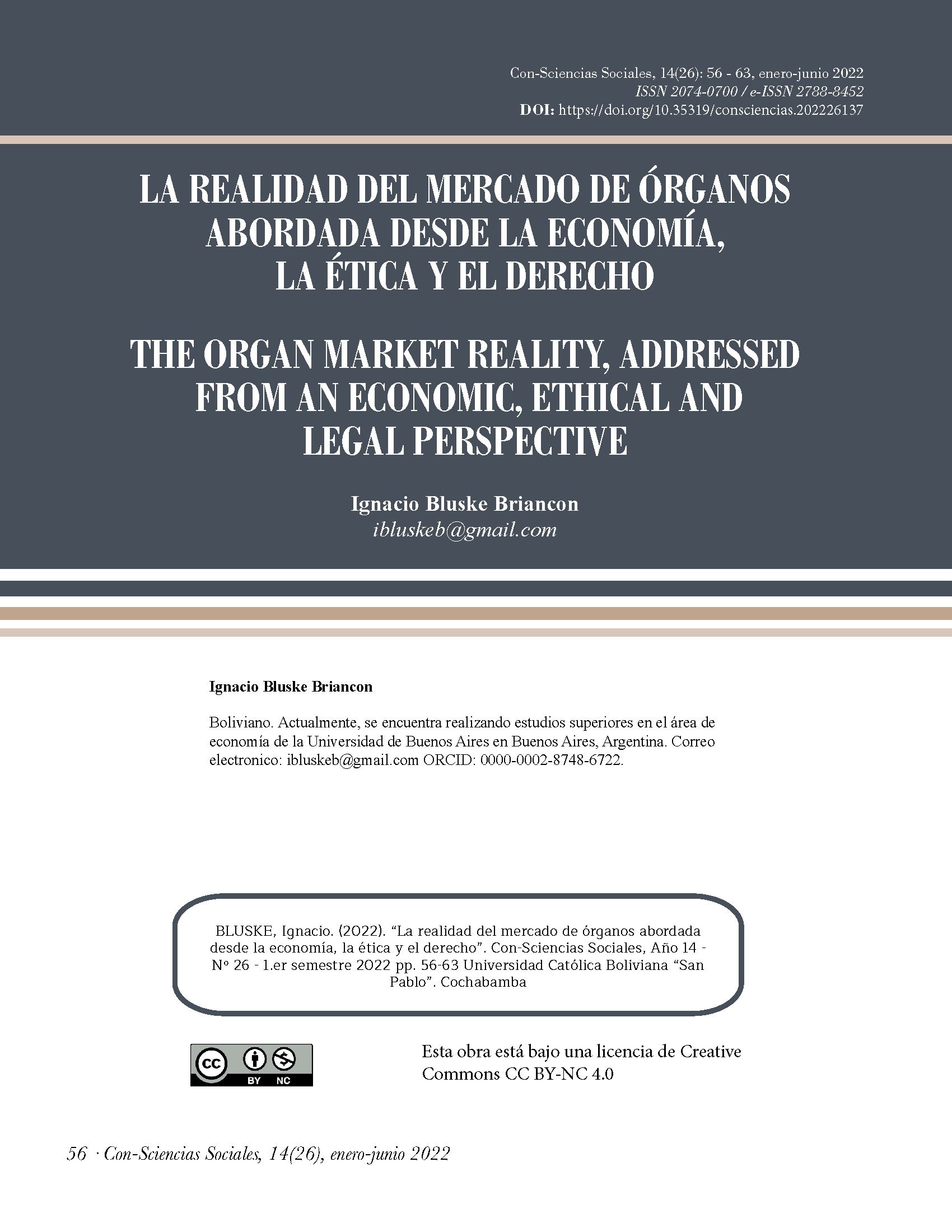The organ market reality, addressed from an economic, ethical and legal perspective
DOI:
https://doi.org/10.35319/consciencias.202226137Keywords:
organ market, moral, ethics, economy, legalization, social welfareAbstract
Currently, the shortage of organs has become a major issue which has increased mortality in the population, as well as human trafficking. The attempts to restrain or put an end to the problem have been deficient, therefore it is necessary to sek the solution in other concepts such as the legalized organ market. This study aims to estimate whether the organ market is beneficial for Tarija’s society from 3 perspectives: economic, legal and moral. From these, it was decided to develop an exploratory research with a qualitative approach to achieve the objective of this study. So, the question arises, is the organ market beneficial for Tarija’s society? As for the legal and economic perspective, it can be said that it is. In the first, only popular support would be required to be able to concretize the legalized organ market, since the Constitution does not prohibit it;, and as for the economic perspective, the existence of such a market could save resources to the State and, in general, it could represent a benefit to all market actors. The problem comes from the moral perspective, since the results are not so enlightening and they even generate debate. In spite of everything, the outlook is promising and who knows? Perhaps in the future it will materialize.
Downloads
References
Becker G. & Elias J. (2007), Introducing Incentives in the Market for Live and Cadaveric Organ Donations, Journal of Economic Perspectives – Volume 21, Number 3 – Summer 2007 – Pages 3 - 24. American Economic Association. DOI: https://doi.org/10.1257/jep.21.3.3
Becker G. & Elias J. (2014), Cash for Kidneys, The Case for a Market for Organs. Dow Jones and Company.
Berloco P.B., Bussotti A., Ferreti S., Morabito V., Novelli G., Poli L.,… & Rossi M. (2007). Is legalizing the organ market possible? In Transplantation proceedings (Vol. 39, No. 6, pp. 1743-1745). Elsevier. DOI: https://doi.org/10.1016/j.transproceed.2007.05.075
Código de Salud [CS]. Decreto Ley 15629 de 1978. 18 de julio de 1978 (Bolivia).
Constitución Política de Bolivia [CPE]. Art. 35. 7 de febrero de 2009 (Bolivia).
Constitución Política de Bolivia [CPE]. Art. 37. 7 de febrero de 2009 (Bolivia).
Constitución Política de Bolivia [CPE]. Art. 43. 7 de febrero de 2009 (Bolivia).
Costa de Oliveira Lucas (2018). Mercado regulado de órganos: El caso de Irán. Revista de Bioética y Derecho, (44), 73-88. https://scielo.isciii.es/pdf/bioetica/n44/1886-5887-bioetica-44-00073.pdf
Decreto Supremo 1870. Por el cual se establecen todas las medidas que van ligadas a trasplantes de órganos, 23 de enero de 2014. Bolivia.
Decreto 15629 de 1978 [con fuerza de ley]. Por medio del cual se aprueba el código de salud actual. 18 de julio de 1978. Bolivia.
Nahra C. (2019), Altruism and Moral Enhancement, Revista Kriterion, 61 (147), 633-648. https://www.researchgate.net/publication/349200568_ALTRUISM_AND_MORAL_ENHANCEMENT DOI: https://doi.org/10.1590/0100-512x2020n14704cn
Rippon, S. (2014). Imposing options on people in poverty: the harm of a live donor organ market. Journal of medical ethics, 40(3), 145-150. https://doi.org/10.1136/medethics-2011-100318 DOI: https://doi.org/10.1136/medethics-2011-100318
Zargooshi, Javaad. (2001). Quality of life Iranian kidney “donors”. The Journal of Urology, 166, 1790 - 1799. Irán. Elsevier. https://doi.org/10.1016/S0022-5347(05)65677-7 DOI: https://doi.org/10.1016/S0022-5347(05)65677-7
Zargooshi, Javaad. (2001). Iranian kidney donors: Motivations and relations with recipients. The Journal of Urology, 165, 386 - 392, Irán. Elsevier. https://doi.org/10.1097/00005392-200102000-00008 DOI: https://doi.org/10.1097/00005392-200102000-00008

Published
How to Cite
Issue
Section
License
Copyright (c) 2022 Revista Con-Sciencias Sociales

This work is licensed under a Creative Commons Attribution-NonCommercial 4.0 International License.









